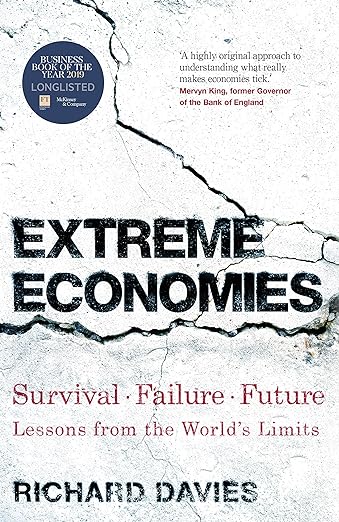Extreme Economies – an EconTalk Podcast
Over the past year or so, I’ve gotten into the habit of regularly listening to EconTalk podcasts when I’m driving. Hosted by Professor Russ Roberts and made possible by Liberty Fund, each episode typically features an author discussing their work – with Russ helping draw out the key themes and implications of their research. The quality of the EconTalk discussions tends to be really high. Russ helps make the topics both accessible to non-specialists and to enable the listener to relate the subjects being discussed to their own studies. I can’t recommend EconTalk enough.

Today, I listened to Russ interviewing economist Richard Davies about his 2019 book, Extreme Economies: Survival, Failure, Future – Lessons from the World’s Limits.
In this EconTalk episode, Davies describes his travels and research into what he terms “extreme economies”, examining economic activity in the harshest of settings. With an eye upon how climate change and other major changes in the world might constrain economic activity, Davies explains that he was motivated to see how economic activity does still function under significant constraints – and what lessons we might draw from such examples.
I found his description of economic life in Angola, the huge prison in Louisiana particularly fascinating. Davies explains that economic and trading activities that helped busy the inmates were welcomed by the guards, as that activity helped regulate life in the prison, contributing to security and good order. Prisons (and refugee camps) can be described as ‘constrained settlements’, as there is restricted access to/from the wider local socio-economic order in which the prison or camp is situated.
Davies’ research confirms the truth of Adam Smith’s observation of people’s natural “propensity to truck, barter, and exchange one thing for another.” Even in the harshest of prisons, trade is always present. Drawing on the work of Carl Menger on the nature and role of money, Davies explains how life in Angola (and other prisons) is powerfully shaped by the emergence of a monetary system, which expands the scope of transactions beyond what simple barter might achieve. (Davies also describes how trade and productive work can be integral to someone’s feeling of self-worth.)
There is much, much more in this podcast – especially about the emergence and role of institutions and customary norms that help regulate human action even in the harshest of environmental or institutional settings. And there is the flipside: Davies also talks about how the emergence of institutions and norms can be inhibited by environmental factors or even consciously designed that way; his description of the two, very different refugee camps speaks to this point. Turning back to Angola, Davies explains how the functioning of existing social structures can be constrained or shattered by ‘shocks’ (such as environmental, technological or legal changes). Davies draws on Carl Menger’s insights on money and currency and an innovation by the now defunct Blockbuster video chain to explain how Angola’s inmates created a new monetary framework to fund their access to a new synthetic cannabis drug.
A great discussion that is well worth your time. Listen here.